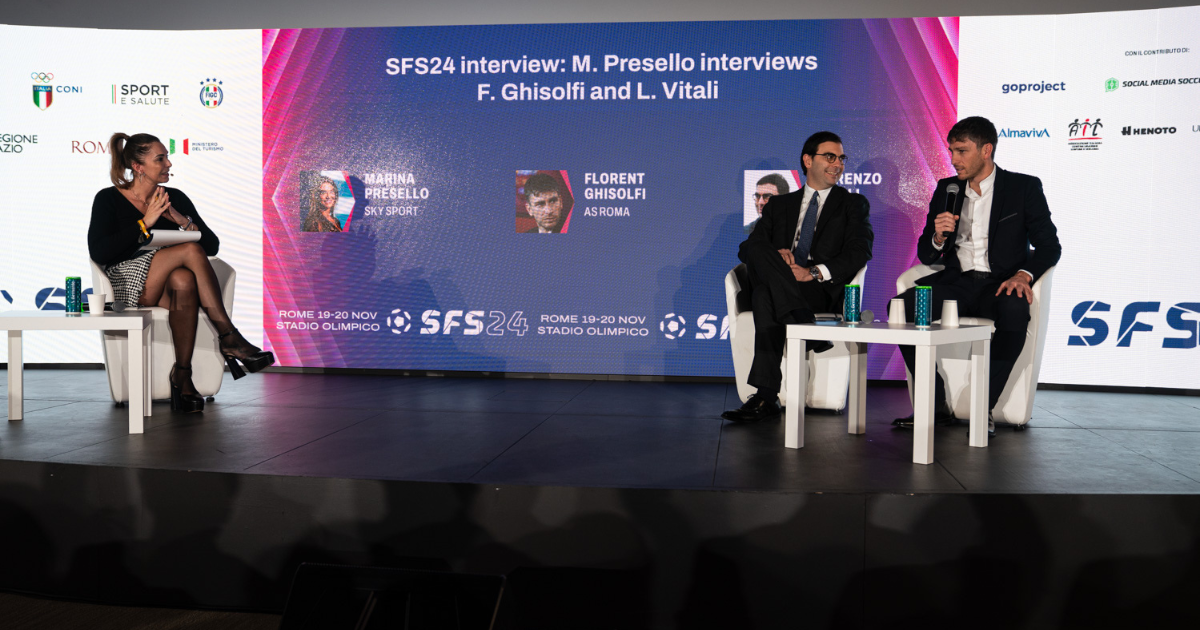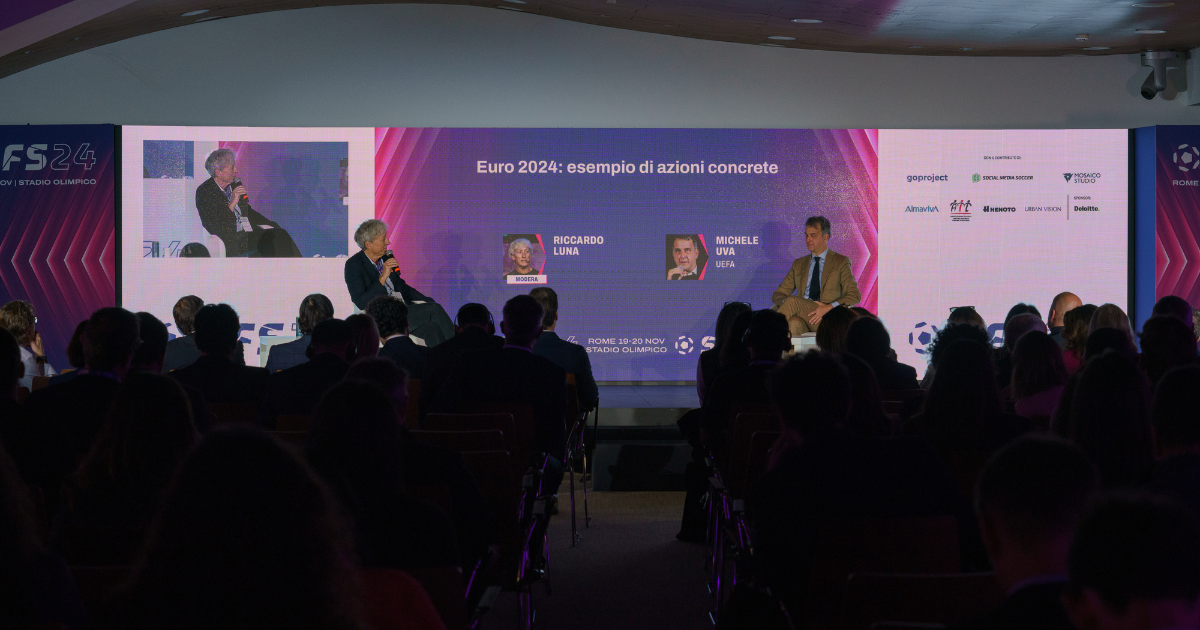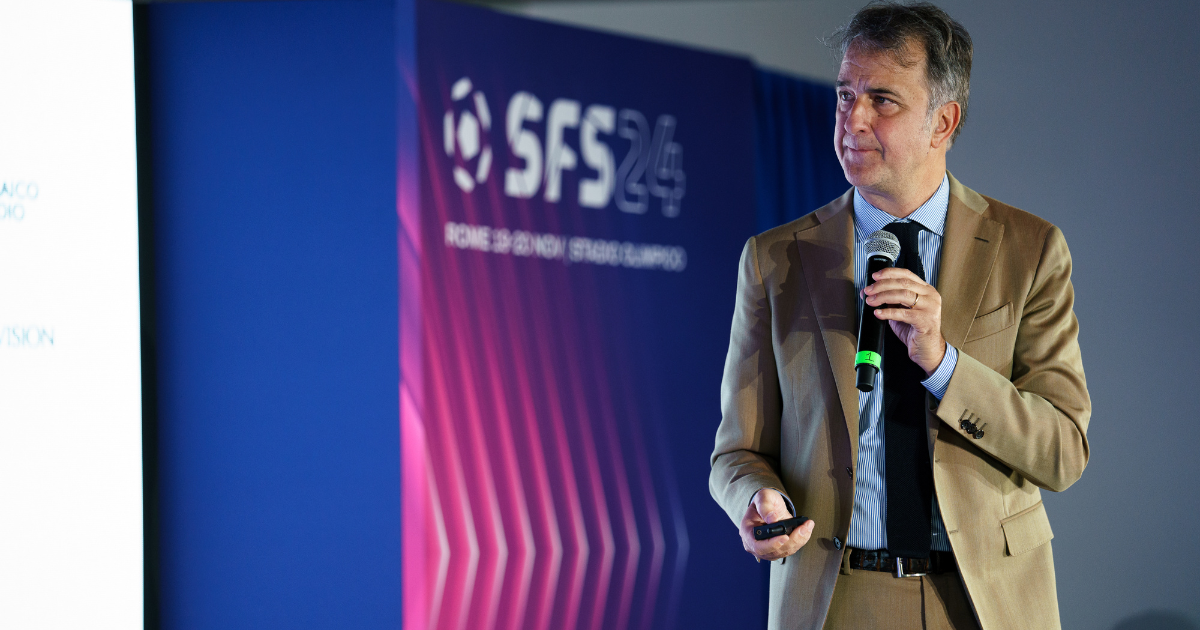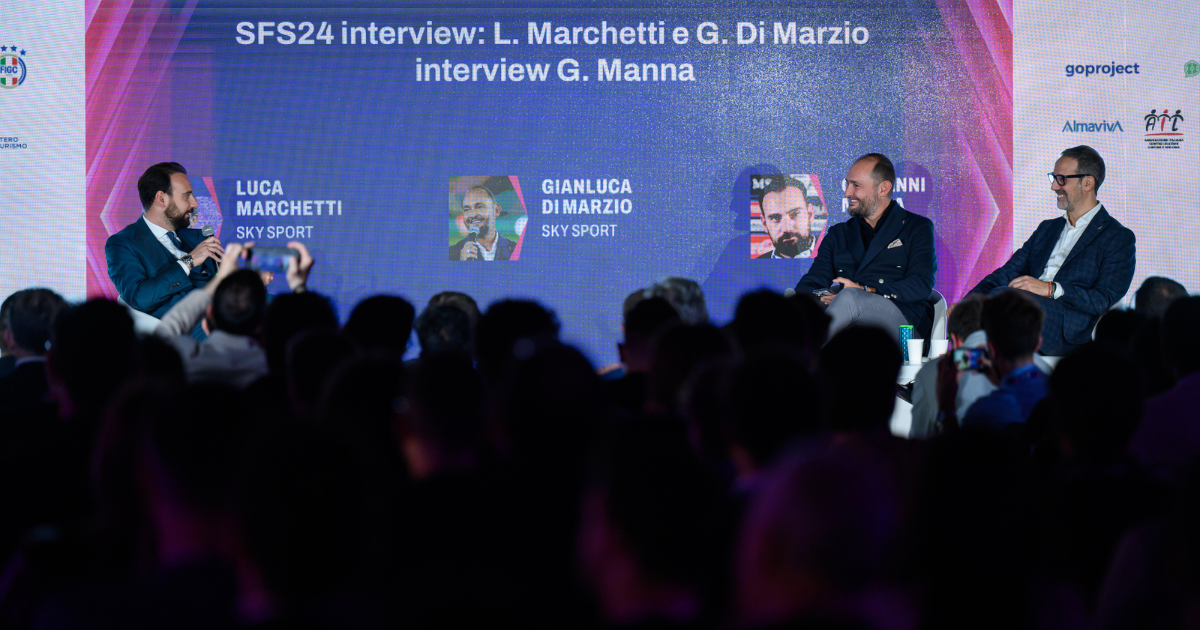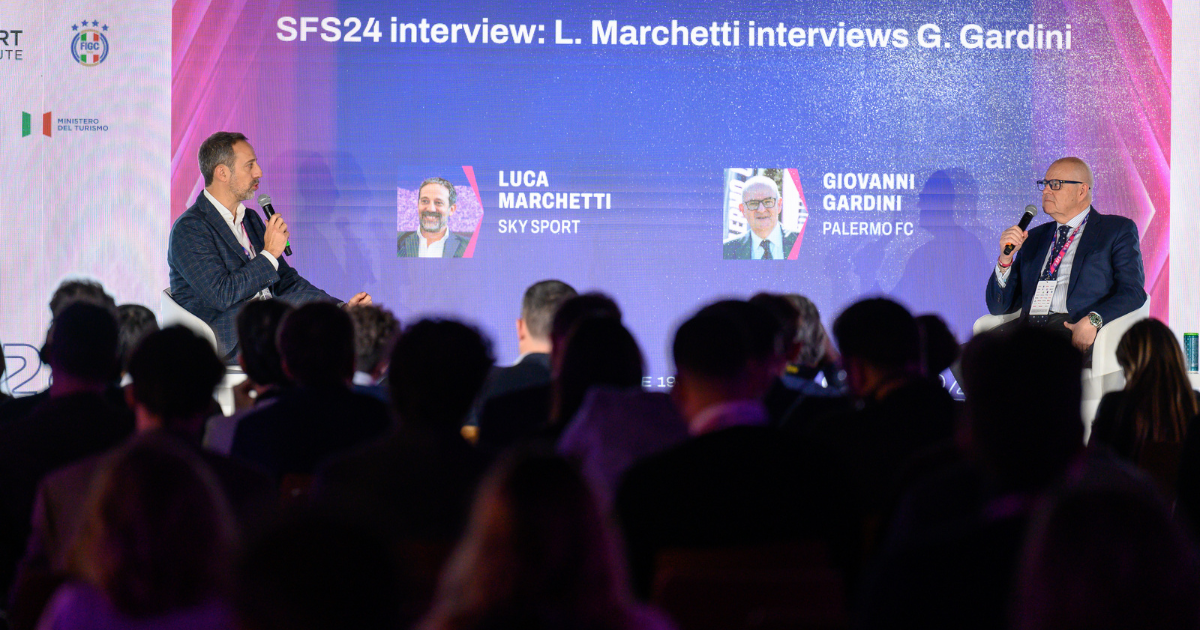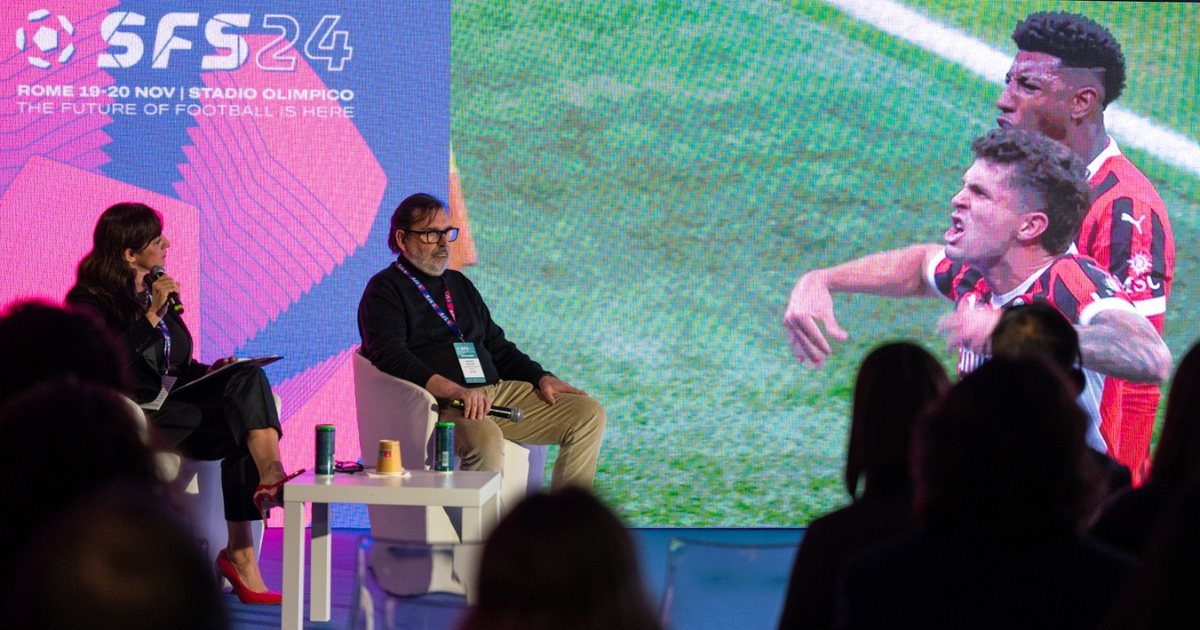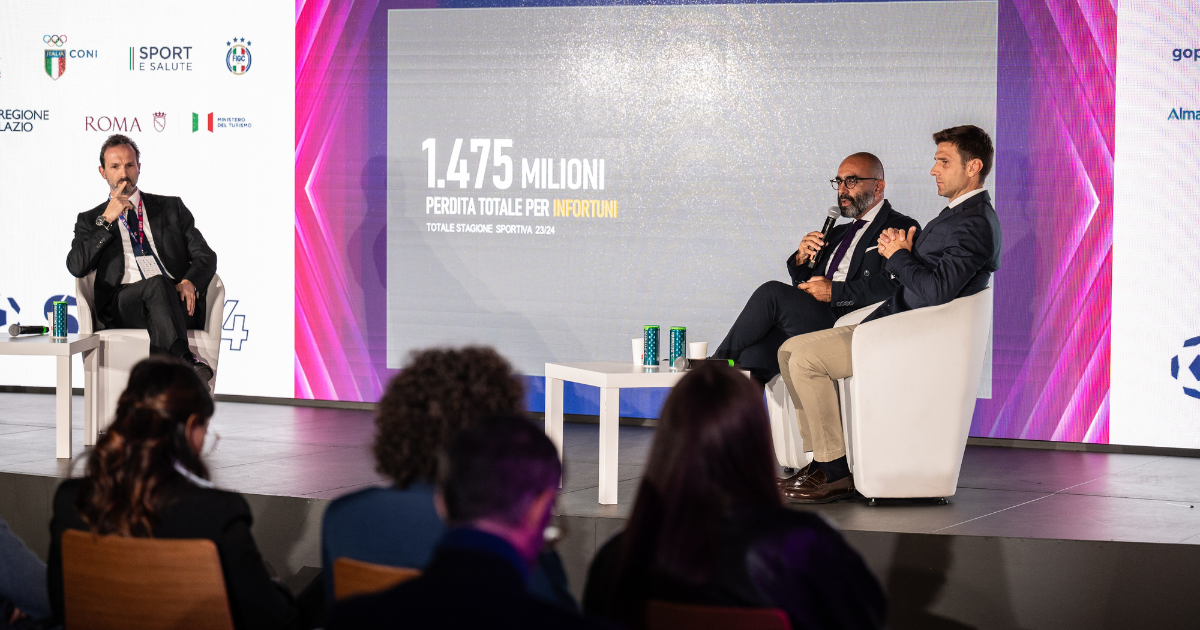During a challenging period for sports results, Lorenzo Vitali – General Counsel of AS Roma – and Florent Ghisolfi – Head of the Technical Area for the Giallorossi – were interviewed on stage at the Summit. In the presence of Sky Sport journalist Marina Presello, the panel analyzed the state of the Roman club from every angle.
Following the dismissal of Daniele De Rossi and the brief tenure of Djuric, the club decided to bet on Claudio Ranieri, a coach with extensive experience and a symbol of Roman pride on a global level. A crucial managerial figure to learn from professionally and to carry forward a dynamic project, as Ghisolfi emphasized during the interview. A skilled coach, appreciated by the Giallorossi fanbase, who never misses an opportunity to express their deep attachment to the jersey – a love to be preserved and nurtured, the two managers stated, and one that must guide every corporate decision.
“We have already selected the site and are carrying out a synergistic effort with the municipality and industry operators. It’s an ambitious project starting from scratch, but we are making good progress. It will embody the values of Roman pride, also thanks to a sophisticated design conceived by leading international architects“, Vitali replied. The new sports facility will become an important nerve center for the city, ready to welcome all Roma supporters. Drawing inspiration from the heritage of Campo Testaccio, the General Counsel specified, the upcoming stadium will combine historical charm with sustainability features: a true greenhouse – open 24/7 – that will further enhance the Roma brand.
The interview also touched on the youth sector and market strategies. Over the years, Roma has launched promising talents such as Niccolò Pisilli, Edoardo Bove, and Nicola Zalewski, thanks in part to the work of professionals like Alberto De Rossi, Bruno Conti, and Roberto Trapani – Youth Sector Head of Recruitment at AS Roma. Among the various projects, there are considerations for creating an Under-23 team, following the model set by Juventus, Milan, and Atalanta.
As for market strategies, Ghisolfi highlighted the need to pursue a sustainable economic approach, focusing on risk assessment and specific organizational structures: “Roma must be an Italian and local brand, but with an international soul, close to the most important players in the world“.
“Roma must be an Italian and local brand, but with an international soul,” said Florent Ghisolfi at SFS24
During a challenging period for sports results, Lorenzo Vitali – General Counsel of AS Roma – and Florent Ghisolfi – Head of the Technical Area for the Giallorossi – were interviewed on stage at the Summit. In the presence of Sky Sport journalist Marina Presello, the panel analyzed the state of the Roman club from every angle. Following the dismissal of Daniele De Rossi and the brief tenure of Djuric, the club decided to bet on Claudio Ranieri, a coach with
“The path to sustainability requires collective action”, said Michele Uva at SFS24
After presenting the ESG strategies implemented for EURO2024, Michele Uva – UEFA’s Director of Social & Environmental Sustainability – was interviewed on stage at the SFS by journalist Riccardo Luna. The panel, titled "Euro2024: an example of concrete actions", focused on sustainability, which Uva himself described as "an essential asset with significant cultural and social influence". Just days before COP29, the United Nations Climate Change Conference, the Summit devoted considerable attention to the interplay between environmental policies and the football
EURO 2024, ESG strategies with Michele UVA
Michele Uva, UEFA Director of Social & Environmental Sustainability, presented a summary of the key ESG (Environmental, Social and corporate Governance) actions implemented for the UEFA Euro 2024 tournament held in Germany at the SFS24. This journey began two and a half years ago with the aim of defining a replicable path for the future for UEFA, federations, and amateur clubs. Before outlining the ESG activities, however, Uva wanted to outline the scope of the event in terms of personnel involved, cumulative
HOW FANS WILL LOOK LIKE IN THE FUTURE, THE DELOITTE ANALYSIS
How can we analyze the fan segment from an industrial standpoint? And, above all, how can we leverage the visceral passion for a club to generate new sources of value? This was the main theme of the panel How fans will look like in the future, scheduled at SFS24. On stage, alongside journalist Anna Maria Baccaro, were the two Deloitte Monitors Luigi Capitanio and Andrea Cabiati. Starting from a market analysis conducted on around two thousand fans worldwide, very interesting data
“We aim for a privately owned stadium and focus on the youth sector,” Giovanni Manna said at the SFS
Giovanni Manna, Sporting Director of Napoli, was a guest at the SFS, interviewed by Sky Sport journalists Luca Marchetti and Gianluca Di Marzio. Many topics were discussed: from his professional journey to future career challenges, as well as the current season under the leadership of Aurelio De Laurentiis in Naples. “At Lugano, I worked as a team manager, and there wasn’t a consolidated structure, so I operated as a self-starter. Fabio Paratici and Walter Sabatini have been indispensable references. A second
“With Palermo, we are halfway through our journey,” Giovanni Gardini said at the SFS
In 2019, Palermo F.C. was relegated to Serie C, going through one of the darkest phases in its history. Today, however, the club plays in Serie B and is one of the most interesting entities in the Italian and European football scene, not only in sporting terms but also from a communication and managerial perspective. This and much more were discussed at the SFS, held on November 19 and 20 at the Stadio Olimpico in Rome. During the Football Stage panel,
Master of Communications: Innovation, Digital Strategies, and New Fan Engagement Models in the Football Industry
The introduction of new communication models and the challenges of contemporary football have brought new hurdles and creative strategies to optimize fan engagement. Fans, being the primary interest of the clubs, must actively be at the center of any targeted action. This was the main topic of the "Master of Communications" panel, held during the seventh edition of the SFS. On stage, several managers from the football industry, such as Ian Taylor – Head of Communications at West Ham United FC,
The Football Market in China: global opportunities amid innovation, passion and strategy
The China's Football Business Landscape Market Report by Triboo - EastMedia highlights China as one of the largest and most promising markets for the global football industry, with 289 million fans. This audience, surpassing any European market in size, represents a key opportunity for commercial expansion, digital innovation, and fan engagement. The Chinese government actively supports football through an ambitious Football Development Plan (2016-2050), aiming to transform the country into a global football powerhouse. The plan includes building infrastructure, increasing grassroots participation, and enhancing professional
SFS24, the business of emotions
"Victory on the field is important, but not enough. The core, in fact, is the emotional bond that moment evokes in the fan. For what purpose? Leveraging the victory to generate new revenues for the club through promotions and sponsorships aimed at strengthening the team". With these words, Pier Donato Vercellone – Chief Communications Officer of AC Milan – introduced the panel “Business of Emotions” at SFS24. Together with Petra Loreggian, a radio voice of the RDS network, they revisited AC Milan’s
“WE MUST PREVENT THE RISK OF INJURIES,” AIC AT SFS24
The SFS24 hosted the Italian Footballers' Association (AIC) on the second day of the Summit. Speaking on stage were the association's president, Umberto Calcagno, Fabio Giuseppe Poli, AIC's Organizational Director, and collaborator Marco Piccinini. "We conducted a study on Serie A, the Premier League, and La Liga, focusing on the 2022-2023 and 2023-2024 seasons, set between the World Cup and continental competitions. We found that the progressive increase in matches has a significant clinical impact on players and has markedly raised



